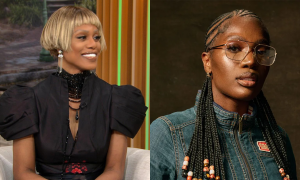Rising star Doechii says that simply existing as a queer Black woman in the music industry is itself a powerful act of resistance — and a necessary contribution to hip-hop.
In a candid new interview with Cosmopolitan, the 2025 Billboard Woman of the Year opened up about how her identity informs her artistry, her role in reshaping the genre, and the importance of amplifying underrepresented voices in the music world.
“This is such a Leo thing to say,” the 25-year-old rapper joked during the interview, “but my literal existence as a queer Black woman is a major contribution to the hip-hop genre.”
Known for blending hard-hitting lyrics with genre-defying beats, Doechii — born Jaylah Hickmon — has had a meteoric rise since the release of her debut studio album, Alligator Bites Never Heal. The project, praised for its fearless storytelling and experimental sound, cemented her place among hip-hop’s most daring new voices. This year alone, she added several major accolades to her name, including the Grammy Award for Best Rap Album and GLAAD Media’s Outstanding Music Artist honor.
A Year of Career-Defining Milestones
Doechii’s recognition at the 2025 Grammy Awards made her just the third Black woman in history to win Best Rap Album, following iconic performances by Lauryn Hill and Cardi B. Her win was hailed as a milestone not just for her career, but for queer representation in hip-hop — a genre that has long grappled with issues of homophobia and gender inclusivity.
“I’m speaking truthfully from a queer Black woman’s perspective,” Doechii told Cosmopolitan. “Being honest about my life through my lens is amazing. That perspective is being highlighted, and we need queer perspectives.”
In the same interview, the “Anxiety” and “Denial Is a River” rapper reflected on how her personal life, including her relationship with her girlfriend, shapes her songwriting and stage presence.
“All of my relationships inspire my music because they make up my life experience,” she said. “Love, heartbreak, joy, struggle — it’s all part of the story I’m telling through my songs.”
Advocacy Through Art
In addition to her musical achievements, Doechii has used her growing platform to advocate for LGBTQ+ rights, particularly trans rights. She has publicly spoken out against anti-trans legislation and often uses her performances and social media platforms to raise awareness around queer and trans issues.
Her advocacy was recognized earlier this year when she took home the award for Outstanding Music Artist at the GLAAD Media Awards. Accepting the honor, she told the crowd, “I make music to heal — for myself and for the people who feel unseen. This award reminds me that the work is resonating.”
As her profile continues to rise, Doechii has made it clear that she’s not interested in fitting into traditional molds or expectations within the music industry. Instead, she’s redefining what it means to be a hip-hop artist — and what kinds of stories that role can contain.
Addressing Performance Controversies
The Grammy Awards were not without controversy for the breakout star. Following her energetic performance of “Catfish” and “Denial Is a River,” some viewers accused her of lip-syncing during the live show — claims that Doechii quickly addressed on social media.
In a TikTok video that garnered millions of views, she clapped back at the rumors, calling conspiracy theorists “stupid as hell.” She later clarified to Cosmopolitan that while her response was “halfway joking,” the accusations struck a nerve.
“Like, please, don’t play with me,” she said. “I don’t cheat. I don’t cut corners, and I take my performances really seriously. So I was clapping back a little bit.”
Doechii went on to explain that her performances are a crucial extension of her artistry and that she works hard to deliver a live experience that’s as emotionally impactful as it is technically sound.
Changing the Face of Hip-Hop
While Doechii’s blend of genre, identity and activism is groundbreaking, she sees herself as part of a larger movement — one that’s gradually shifting the landscape of hip-hop to be more inclusive, more vulnerable, and more real.
“There’s space for us,” she said. “There’s power in being visible, in being honest, in telling our stories. I’m not the only queer Black artist in this industry, but I’m proud to be one of the loudest.”
From her genre-defying music to her unapologetic voice on social issues, Doechii is carving out a new lane for herself — and creating space for others to follow. Whether she’s taking the stage at awards shows, topping charts, or speaking up for marginalized communities, she’s proving that identity isn’t just part of the narrative — it is the narrative.
As she continues her ascent, one thing is clear: Doechii isn’t just contributing to hip-hop — she’s actively transforming it.







